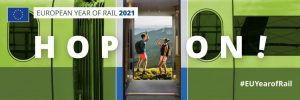 CER, EIM and UNIFE are calling the EU Presidents to extent the activities to promote rail until December 2022 for a greater success of the Year of Rail initiative. The three associations, consider that the sanitary constraints due to pandemic are impeding the full deployment of stakeholders’ activities to promote rail.
CER, EIM and UNIFE are calling the EU Presidents to extent the activities to promote rail until December 2022 for a greater success of the Year of Rail initiative. The three associations, consider that the sanitary constraints due to pandemic are impeding the full deployment of stakeholders’ activities to promote rail.
The call was announced in an open letter sent to five EU officials – David Maria Sassoli, the President of the European Parliament, Charles Michel, the President of the European Council, Ursula von der Leyen, the President of the European Commission, Frans Timmermans, the First Executive Vice President of the European Commission for the European Green Deal and to Adina-Ioana Vălean, the European Commissioner for Transport.
In addition, letter was also sent to Karima Delli, the Chairman of the European Parliament – Committee on transport and tourism, Anna Deparnay-Grunenberg, Member of the European Parliament, Pedro Nuno Santos, Portugal’s Minister of Planning and Infrastructure, Jernej Vrtovec, Slovenia’s Minister of Infrastructure, Jean-Baptiste Djebbari, the French Minister with responsibility for Transport, and to Karel Havlíček, the Minister of Transport of the Czech Republic. The letter was sent to these ministers of the four countries as they will have a key role to the decision because Slovenia, France and Czechia will take the next presidency of the Council of the EU until December 2022. Until June 2021, the priorities of Portugal’s presidency are driven by its motto: “Time to deliver: a fair, green and digital recovery”.
On 29 March, the Portuguese Presidency of the Council and the European Commission Directorate-General for Mobility officially kicked-off the European Year of Rail. After that, rail companies and associations including CER, EIM and UNIFE had planned to start implementing a dense series of initiatives intended to make the most out of the European Year of Rail.
EIM members have started planning and organising specific events in coordination with the relevant partners, including the Connecting Europe Express initiative. Connecting Europe Express is an exhibition train that is set to start its journey in Lisbon, travel across 25 Member States including Slovenia and the Czech Republic and arrive in Paris five weeks after with a series of events scheduled to take place in all capitals where the train stops. If initially CER planned to have the train leaving Lisbon in June, today, because of the pandemic, CER has been forced to schedule its departure in September 2021.
Since January EIM is also deploying a bespoke social media campaign related to the European Year of Rail and the concrete activities in the field. The letter says that “unfortunately, the campaign may not deploy all its full potential due to the national health and safety measures and the underlying travel restrictions. However, these activities are necessary to showcase the benefits of investments in physical and digital rail infrastructure for the society and the economy. This proves even more true in a context of reforms related to the TEN-T and the RFCs later this year.”
UNIFE and its members have prepared a communication campaign covering 12 themes throughout 2021. The year-long campaign formally kicked off in January, however until now the results are not as expected due to COVID-19 effects and restrictions. The UNIFE Chairman reiterated and reaffirmed the European Rail Supply Industry’s commitment for this initiative during its official launch on 29 March.
In parallel, rail companies started planning numerous communication campaigns at national level to explain that rail is the most sustainable mode of transport and the safest mobility option, that rail is undergoing a digital make-over of its processes and services and has its place among the deep roots of European culture and contributes to defining what Europe will be in the future.
In the context of the European Green Deal, the European Year of Rail is a wonderful and unique opportunity to implement the activities to promote rail and its key contribution to a stronger internal market, to job creation, territorial and social cohesion and of course to a smart, digital and sustainable mobility system that reconciles performance and reduction of CO2 emissions.
However, in 2020 nobody could foresee that the pandemic would last this long, with the effects everybody can see today. “It is unfortunately very clear now that our collective efforts are jeopardised by a pandemic that prevents having any degree of certainty regarding the possibility to organise in-person events and other public gatherings. In fact, there is a very concrete risk that upcoming scheduled events will have to be postponed until the situation improves or just cancelled, and that the allocated resources will be spent in vain – something we can ill afford at a time when railways are suffering huge losses because of COVID-19.”
Share on:



